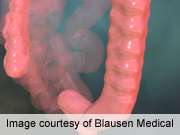(HealthDay)—Fecal hemoglobin concentration, sex, and age can be used to classify the risk of advanced colorectal neoplasia among individuals with positive results from fecal immunochemical tests (FITs), according to a study published in the September issue of Gastroenterology.
Josep M. Auge, M.D., from Hospital Clínic in Barcelona, Spain, and colleagues retrospectively analyzed data from a consecutive series of 3,109 participants with positive results from FITs (≥20 µg/g of feces) included in the first round of the Barcelona colorectal cancer screening program (December 2009 through February 2012). A colonoscopy was performed in all patients and they were classified according to advanced or nonadvanced colorectal neoplasia.
The researchers found that participants with advanced colorectal neoplasia had significantly higher median fecal hemoglobin concentrations compared with participants with nonadvanced colorectal neoplasia (105 versus 47 µg/g; P < 0.001). Using arbitrary fecal hemoglobin concentrations, positive predictive values for advanced colorectal neoplasia varied by sex and age. Independent predictive factors for advanced colorectal neoplasia were male sex (odds ratio [OR], 2.07); age of 60 to 69 years (OR, 1.24); and fecal hemoglobin concentration >177 µg/g (OR, 3.80). Sixteen risk categories were identified based on these factors, and the risk for advanced colorectal neoplasia was increased 11.46-fold among those in the highest risk category versus the lowest category.
"These factors should be used to prioritize individuals for colonoscopy examination," the authors write.
More information:
Abstract
Full Text (subscription or payment may be required)
Journal information: Gastroenterology
Copyright © 2014 HealthDay. All rights reserved.




















